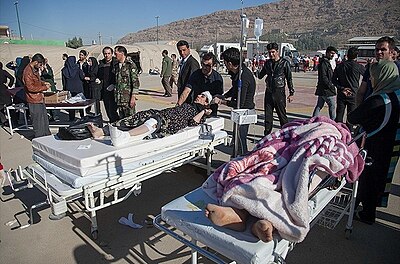This article needs additional citations for verification. (March 2013) |
| Occupation | |
|---|---|
| Names |
|
Occupation type | Specialty |
Activity sectors | Medicine |
| Description | |
Education required |
|
Fields of employment | Hospitals, Clinics |



Disaster medicine is the area of medical specialization serving the dual areas of providing health care to disaster survivors and providing medically related disaster preparation, disaster planning, disaster response and disaster recovery leadership throughout the disaster life cycle. Disaster medicine specialists provide insight, guidance and expertise on the principles and practice of medicine both in the disaster impact area and healthcare evacuation receiving facilities to emergency management professionals, hospitals, healthcare facilities, communities and governments. The disaster medicine specialist is the liaison between and partner to the medical contingency planner, the emergency management professional, the incident command system, government and policy makers.
Disaster medicine is unique among the medical specialties in that unlike all other areas of specialization, the disaster medicine specialist does not practice the full scope of the specialty everyday but only in emergencies. Indeed, the disaster medicine specialist hopes to never practice the full scope of skills required for board certification. However, like specialists in public health, environmental medicine and occupational medicine, disaster medicine specialists engage in the development and modification of public and private policy, legislation, disaster planning and disaster recovery. Within the United States of America, the specialty of disaster medicine fulfills the requirements set for by Homeland Security Presidential Directives (HSPD), the National Response Plan (NRP), the National Incident Management System (NIMS), the National Resource Typing System (NRTS) and the NIMS Implementation Plan for Hospitals and Healthcare Facilities.